八年级英语上册Unit4 Do it yourself Period3 Grammar上课课件(共41张PPT)牛津译林版
文档属性
| 名称 | 八年级英语上册Unit4 Do it yourself Period3 Grammar上课课件(共41张PPT)牛津译林版 |  | |
| 格式 | pptx | ||
| 文件大小 | 4.1MB | ||
| 资源类型 | 教案 | ||
| 版本资源 | 牛津译林版 | ||
| 科目 | 英语 | ||
| 更新时间 | 2025-02-15 09:25:11 | ||
图片预览






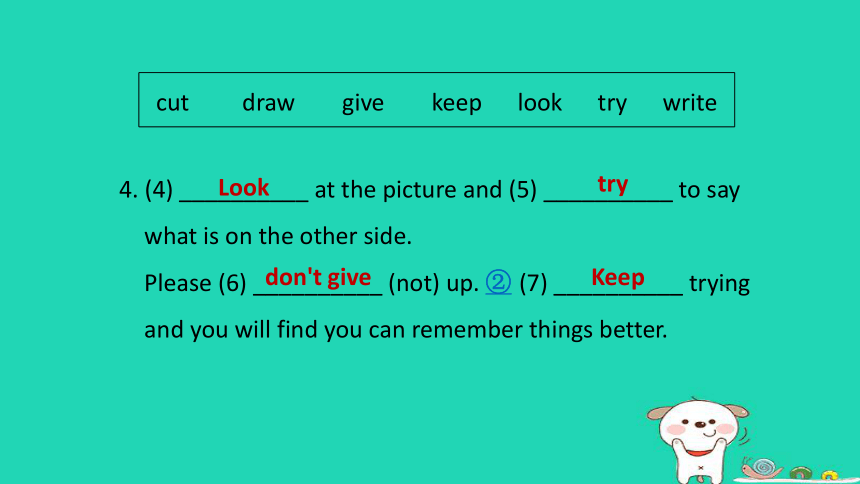

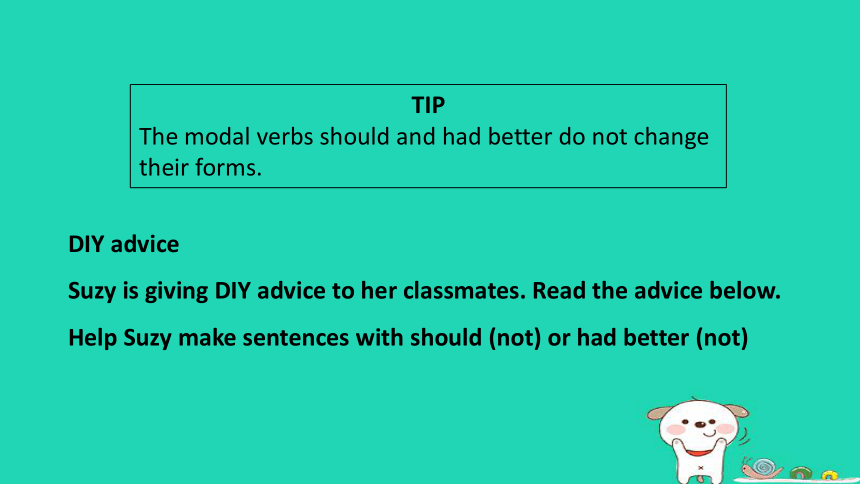
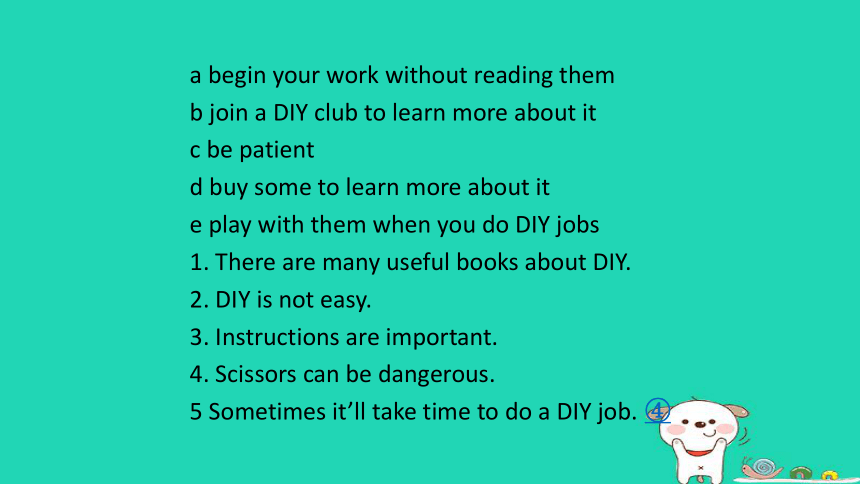
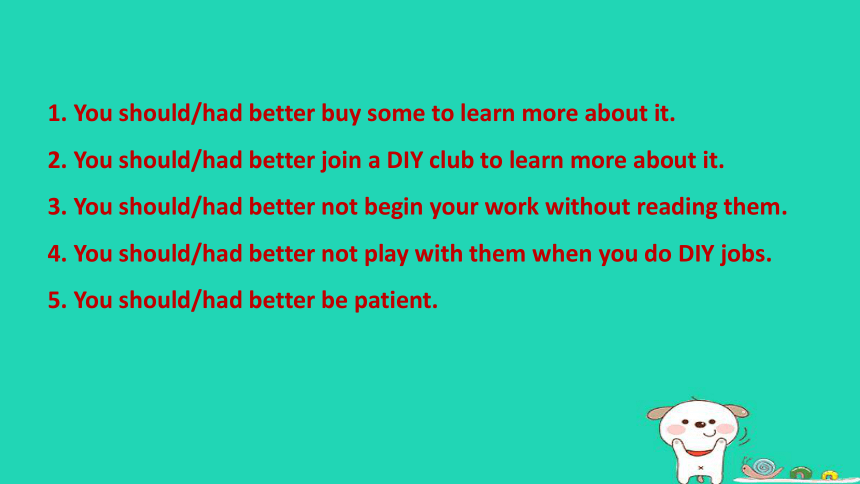
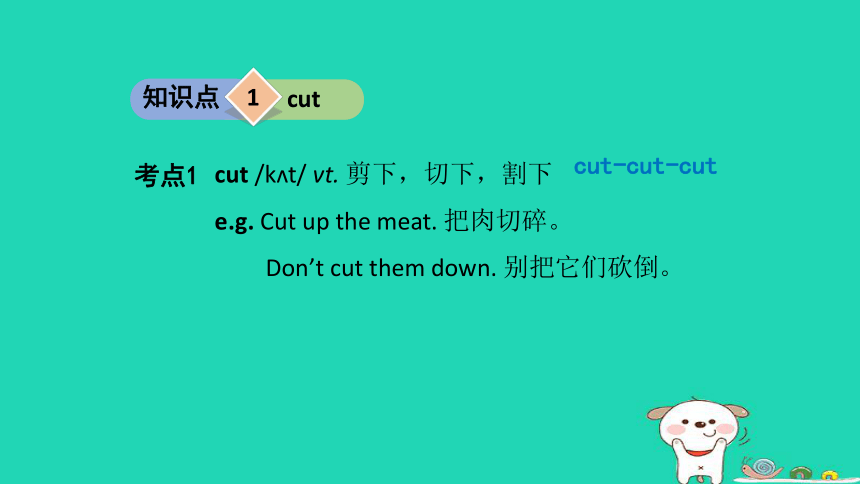
文档简介
(共41张PPT)
Unit 4 Do it yourself
Period 3 Grammar
1
课时导入
2
课文呈现
3
考点精讲
4
单元
语法沙龙
5
课堂小结
读一读下面的几则英文标语,你有什么发现?
Grammar
A. Giving instructions
We start a sentence with the base form of a verb when we want to tell people what to do.
Put up a picture on the wall.
Paint the walls blue.
We add do not/don’t in front of a verb when we want to tell people not to do something.
Don’t paint the cat.
We often add please in a sentence to make an instruction more polite.
Please fix the shelf for me.
Don’t touch the wet paint, please.
How to make cards
Millie is teaching her classmates how to make cards to help them remember things better. Look at the pictures and help Millie complete the instructions.
1. (1)__________ out pieces of card with a pair of scissors.
2. (2) __________ some words or a sentence on each card.
3. (3) __________ a picture about the words or sentence on the other side of the card.
Cut
cut① draw give keep look try write
Write
Draw
温馨提示:此符号表示“考点精讲点拨”链接。
4. (4) __________ at the picture and (5) __________ to say what is on the other side.
Please (6) __________ (not) up. ② (7) __________ trying and you will find you can remember things better.
cut draw give keep look try write
Look
try
don't give
Keep
B. Using should and had better
We use should and had better when giving advice and telling people what we think is the best or right thing to do. ③ The tone of had better is stronger than should.
You should know a little about DIY.
You should not put so many books on the shelf.
Your watch is broken. You had better buy a new one.
You had better not be late for school.
TIP
The modal verbs should and had better do not change their forms.
DIY advice
Suzy is giving DIY advice to her classmates. Read the advice below. Help Suzy make sentences with should (not) or had better (not)
a begin your work without reading them
b join a DIY club to learn more about it
c be patient
d buy some to learn more about it
e play with them when you do DIY jobs
1. There are many useful books about DIY.
2. DIY is not easy.
3. Instructions are important.
4. Scissors can be dangerous.
5 Sometimes it’ll take time to do a DIY job. ④
1. You should/had better buy some to learn more about it.
2. You should/had better join a DIY club to learn more about it.
3. You should/had better not begin your work without reading them.
4. You should/had better not play with them when you do DIY jobs.
5. You should/had better be patient.
cut /k t/ vt. 剪下,切下,割下
e.g. Cut up the meat. 把肉切碎。
Don’t cut them down. 别把它们砍倒。
考点1
cut-cut-cut
知识点
1
cut
cut 的常用搭配
cut out 删除
cut down 砍倒;减少
cut up 切碎
cut off 切掉;中断
返回
考题1:[广元] —Tina, I want to make some soup. Can you _______ some tomatoes for me
—Sure, no problem.
A. make up B. fix up C. put up D. cut up
D
【点拨】用短语辨析法。句意:—蒂娜,我想做点汤。你能帮我切一些西红柿吗 —当然,没问题。make up组成,编造;fix up 修理;put up 举起,建起;cut up 切碎。根据语境和生活常识可知,应将西红柿切碎才可以做汤。
give up 放弃
e.g. To keep healthy, the doctor advised him to give up smoking.
为了保持健康,医生建议他戒烟。
考点2
知识点
2
Please (6)______ (not) up.
特别解读
give up 作及物动词时,后接名词、代词或动词-ing 形式。其后接代词作宾语时,代词要放在give 和up 之间。
返回
考题2:[常州] 如果你放弃,你就会落后。
You _____________________________.
will fall behind if you give up
(重点) advice / d'va s/ n. 建议, 忠告, 劝告(an opinion or a suggestion about what people should do in a particular situation)
考点3
知识点
3
We use should and had better when giving advice and
telling people what we think is the best or right thing to do.
give sb. some advice on sth. 在某方面给某人一些建议advice 为不可数名词,表达“一条建议”用“a piece of advice”。
辨析: advice 与suggestion
advice 是不可数名词,指侧重依据个人经验、学识和正确判断而提出的“忠告,劝告”。
suggestion 是可数名词,指为改进工作、解决困难等提出的“建议,提议”,有时所提的建议不一定正确,含仅供参考的意味。
e.g. Here are some pieces of advice for you.
这是给你的几条建议。
Please give us some advice on how to save money.
请就如何省钱给我们一些建议吧。
What a useful suggestion!
多么有用的一条建议啊!
She gave me some advice on how to learn English well.
她给了我一些关于怎样学好英语的建议。
返回
考题3:[锦州] —What _____ can you give me on my future study
—Believe in yourself. You can do it.
A. news B. advice
C. attention D. information
新闻 建议
注意 信息
B
job /d b/ n. 工作
e.g. Tom was in danger of losing his job.
汤姆处于丢掉他的工作的危险中。
I have a lot of work to do today.
今天我有许多工作要做。
She found a job as a waitress.
她找了个工作,当服务员。
考点4
常指抽象意义上的工作,
是不可数名词。
常指某项具体的工作,
是可数名词。
知识点
4
Sometimes it’ll take time to do a DIY job.
返回
考题4:—Well, you look so happy!
—Because I got a good ________.
A. work B. news
C. job D. information
工作 新闻
工作 信息
C
祈使句
祈 使 句 表达命令、请求、劝告、警告、禁止等的句子叫祈使句,它的主语通常省略。 类型 Do 型: 动词原形(+宾语)+ 其他省略主语you。① Be 型: Be+ 表语(名词或形容词)+ 其他,省略主语you。② Let’s 型 : Let’s+ 动词原形+ 其他。③ 否定形式∶无动词的祈使句的否定形式在名词前加“No”,表示禁止。④ 祈使句的 反意疑问句 Do 型和Be 型的祈使句通常用“will you ” ⑤
Let’s 型的祈使句用“shall we ” ⑥
Let us 型的祈使句用“will you ” ⑦
e.g. Open the door, please. 请打开门。
考点1
考题1:[广元] —______ silent, please! You are in the library.
—I’m sorry, madam.
A. Keep B. To keep
C. Keeping D. Kept
A
【点拨】用句子分析法。根据空白处所在句子可知,该句应是一个祈使句。祈使句应以动词原形开头。
返回
e.g. Be a good child! 做一个好孩子!
特别提醒:
Do 型和Be 型的否定式都是在句首加“Don’t”构成。
Don’t be late again. 不要再迟到了。
考点2
考题2:[遂宁] — Sam, _____ run in the hallways. It’s very dangerous.
—Sorry, Ms. Black.
A. do B. don’t C. not D. doesn’t
B
返回
e.g. Let’s play football together.
咱们一起踢足球吧。
(易错) Let us + 动词原形 + 其他. (Let us 只是对听话者说,不包含听话者在内,省略的主语是you)
考点3
考题3:[龙东] —Mum, let’s order some food online for dinner, ______
—Good idea. I’d like some beef dumplings.
A. will you B. won’t you C. shall we
【点拨】以Let’s 开头的祈使句,后面的附加问句要用shall we。
C
返回
e.g. No smoking! 禁止吸烟!
e.g. Look at the blackboard, will you 看黑板,好吗?
Don’t look out of the window, will you
不要向窗外看,好吗?
e.g. Let’s play basketball together, shall we
咱们一起打篮球,好吗?
考点4
考点5
考点6
返回
e.g. Let us go to play football, will you
让我们去踢足球,好吗?
考点7
速记小法
祈使句记忆口诀: 祈使句无主语,主语you 常省去;动词原形谓语当,句首加don’t 否定变;朗读应当用降调,句末常标感叹号。
返回
should 与had better 的用法
should 与had better 的用法 should 常用句式①
其他用法②
had better 意为“最好”,没有人称和数的变化,其后接动词原形。③
否定形式:在其后加not。④
should 作情态动词,使用时要遵循情态动词的一般规则。肯定句:“主语+should + 动词原形+ 其他.”。否定句:“主语+should + not + 动词原形+ 其他.”。特殊疑问句:“特殊疑问词+should + 主语 + 动词原形+ 其他?”。
e.g. You should clean the classroom every day.
你们应该每天打扫教室。
You should not keep a pet if you don’t have enough time.
如果你没有足够的时间,你不应该养宠物。
What should I do now 我现在该干什么?
考点1
考题4:[镇江] —I don’t care what Kate thinks.
—Well, you ______. Her suggestions are of some value.
A. would B. should
C. might D. could
【点拨】根据答句的后句句意“她的建议有些价值”,可知答句的前句句意是“嗯,你应该(在意Kate 怎么想)”。表示“应当、应该”用should。
B
返回
should 用在第一人称的疑问句中,表示征求对方的意见,语气委婉。
e.g. Should I take my pet with me
我可以带上我的宠物吗?
特别提醒:
should 也可以作shall 的过去式,可以在间接引语中与第一人称搭配,用于过去将来时。
考点2
e.g. A week ago, I told him that I should go to Beijing the next day.
一周前,我告诉他我第二天要去北京。
返回
e.g. You had better sit here and have a rest.
你最好坐这儿休息一下。
e.g. You had better not say it again.
你最好不要再提那件事了。
特别提醒: 否定副词not 不能放在had 后面。
考点3
考点4
返回
本节课主要学习了以下知识点,请同学们及时巩固练习:
祈使句
should与had better
知识是力量,
梦想是翅膀。
Unit 4 Do it yourself
Period 3 Grammar
1
课时导入
2
课文呈现
3
考点精讲
4
单元
语法沙龙
5
课堂小结
读一读下面的几则英文标语,你有什么发现?
Grammar
A. Giving instructions
We start a sentence with the base form of a verb when we want to tell people what to do.
Put up a picture on the wall.
Paint the walls blue.
We add do not/don’t in front of a verb when we want to tell people not to do something.
Don’t paint the cat.
We often add please in a sentence to make an instruction more polite.
Please fix the shelf for me.
Don’t touch the wet paint, please.
How to make cards
Millie is teaching her classmates how to make cards to help them remember things better. Look at the pictures and help Millie complete the instructions.
1. (1)__________ out pieces of card with a pair of scissors.
2. (2) __________ some words or a sentence on each card.
3. (3) __________ a picture about the words or sentence on the other side of the card.
Cut
cut① draw give keep look try write
Write
Draw
温馨提示:此符号表示“考点精讲点拨”链接。
4. (4) __________ at the picture and (5) __________ to say what is on the other side.
Please (6) __________ (not) up. ② (7) __________ trying and you will find you can remember things better.
cut draw give keep look try write
Look
try
don't give
Keep
B. Using should and had better
We use should and had better when giving advice and telling people what we think is the best or right thing to do. ③ The tone of had better is stronger than should.
You should know a little about DIY.
You should not put so many books on the shelf.
Your watch is broken. You had better buy a new one.
You had better not be late for school.
TIP
The modal verbs should and had better do not change their forms.
DIY advice
Suzy is giving DIY advice to her classmates. Read the advice below. Help Suzy make sentences with should (not) or had better (not)
a begin your work without reading them
b join a DIY club to learn more about it
c be patient
d buy some to learn more about it
e play with them when you do DIY jobs
1. There are many useful books about DIY.
2. DIY is not easy.
3. Instructions are important.
4. Scissors can be dangerous.
5 Sometimes it’ll take time to do a DIY job. ④
1. You should/had better buy some to learn more about it.
2. You should/had better join a DIY club to learn more about it.
3. You should/had better not begin your work without reading them.
4. You should/had better not play with them when you do DIY jobs.
5. You should/had better be patient.
cut /k t/ vt. 剪下,切下,割下
e.g. Cut up the meat. 把肉切碎。
Don’t cut them down. 别把它们砍倒。
考点1
cut-cut-cut
知识点
1
cut
cut 的常用搭配
cut out 删除
cut down 砍倒;减少
cut up 切碎
cut off 切掉;中断
返回
考题1:[广元] —Tina, I want to make some soup. Can you _______ some tomatoes for me
—Sure, no problem.
A. make up B. fix up C. put up D. cut up
D
【点拨】用短语辨析法。句意:—蒂娜,我想做点汤。你能帮我切一些西红柿吗 —当然,没问题。make up组成,编造;fix up 修理;put up 举起,建起;cut up 切碎。根据语境和生活常识可知,应将西红柿切碎才可以做汤。
give up 放弃
e.g. To keep healthy, the doctor advised him to give up smoking.
为了保持健康,医生建议他戒烟。
考点2
知识点
2
Please (6)______ (not) up.
特别解读
give up 作及物动词时,后接名词、代词或动词-ing 形式。其后接代词作宾语时,代词要放在give 和up 之间。
返回
考题2:[常州] 如果你放弃,你就会落后。
You _____________________________.
will fall behind if you give up
(重点) advice / d'va s/ n. 建议, 忠告, 劝告(an opinion or a suggestion about what people should do in a particular situation)
考点3
知识点
3
We use should and had better when giving advice and
telling people what we think is the best or right thing to do.
give sb. some advice on sth. 在某方面给某人一些建议advice 为不可数名词,表达“一条建议”用“a piece of advice”。
辨析: advice 与suggestion
advice 是不可数名词,指侧重依据个人经验、学识和正确判断而提出的“忠告,劝告”。
suggestion 是可数名词,指为改进工作、解决困难等提出的“建议,提议”,有时所提的建议不一定正确,含仅供参考的意味。
e.g. Here are some pieces of advice for you.
这是给你的几条建议。
Please give us some advice on how to save money.
请就如何省钱给我们一些建议吧。
What a useful suggestion!
多么有用的一条建议啊!
She gave me some advice on how to learn English well.
她给了我一些关于怎样学好英语的建议。
返回
考题3:[锦州] —What _____ can you give me on my future study
—Believe in yourself. You can do it.
A. news B. advice
C. attention D. information
新闻 建议
注意 信息
B
job /d b/ n. 工作
e.g. Tom was in danger of losing his job.
汤姆处于丢掉他的工作的危险中。
I have a lot of work to do today.
今天我有许多工作要做。
She found a job as a waitress.
她找了个工作,当服务员。
考点4
常指抽象意义上的工作,
是不可数名词。
常指某项具体的工作,
是可数名词。
知识点
4
Sometimes it’ll take time to do a DIY job.
返回
考题4:—Well, you look so happy!
—Because I got a good ________.
A. work B. news
C. job D. information
工作 新闻
工作 信息
C
祈使句
祈 使 句 表达命令、请求、劝告、警告、禁止等的句子叫祈使句,它的主语通常省略。 类型 Do 型: 动词原形(+宾语)+ 其他省略主语you。① Be 型: Be+ 表语(名词或形容词)+ 其他,省略主语you。② Let’s 型 : Let’s+ 动词原形+ 其他。③ 否定形式∶无动词的祈使句的否定形式在名词前加“No”,表示禁止。④ 祈使句的 反意疑问句 Do 型和Be 型的祈使句通常用“will you ” ⑤
Let’s 型的祈使句用“shall we ” ⑥
Let us 型的祈使句用“will you ” ⑦
e.g. Open the door, please. 请打开门。
考点1
考题1:[广元] —______ silent, please! You are in the library.
—I’m sorry, madam.
A. Keep B. To keep
C. Keeping D. Kept
A
【点拨】用句子分析法。根据空白处所在句子可知,该句应是一个祈使句。祈使句应以动词原形开头。
返回
e.g. Be a good child! 做一个好孩子!
特别提醒:
Do 型和Be 型的否定式都是在句首加“Don’t”构成。
Don’t be late again. 不要再迟到了。
考点2
考题2:[遂宁] — Sam, _____ run in the hallways. It’s very dangerous.
—Sorry, Ms. Black.
A. do B. don’t C. not D. doesn’t
B
返回
e.g. Let’s play football together.
咱们一起踢足球吧。
(易错) Let us + 动词原形 + 其他. (Let us 只是对听话者说,不包含听话者在内,省略的主语是you)
考点3
考题3:[龙东] —Mum, let’s order some food online for dinner, ______
—Good idea. I’d like some beef dumplings.
A. will you B. won’t you C. shall we
【点拨】以Let’s 开头的祈使句,后面的附加问句要用shall we。
C
返回
e.g. No smoking! 禁止吸烟!
e.g. Look at the blackboard, will you 看黑板,好吗?
Don’t look out of the window, will you
不要向窗外看,好吗?
e.g. Let’s play basketball together, shall we
咱们一起打篮球,好吗?
考点4
考点5
考点6
返回
e.g. Let us go to play football, will you
让我们去踢足球,好吗?
考点7
速记小法
祈使句记忆口诀: 祈使句无主语,主语you 常省去;动词原形谓语当,句首加don’t 否定变;朗读应当用降调,句末常标感叹号。
返回
should 与had better 的用法
should 与had better 的用法 should 常用句式①
其他用法②
had better 意为“最好”,没有人称和数的变化,其后接动词原形。③
否定形式:在其后加not。④
should 作情态动词,使用时要遵循情态动词的一般规则。肯定句:“主语+should + 动词原形+ 其他.”。否定句:“主语+should + not + 动词原形+ 其他.”。特殊疑问句:“特殊疑问词+should + 主语 + 动词原形+ 其他?”。
e.g. You should clean the classroom every day.
你们应该每天打扫教室。
You should not keep a pet if you don’t have enough time.
如果你没有足够的时间,你不应该养宠物。
What should I do now 我现在该干什么?
考点1
考题4:[镇江] —I don’t care what Kate thinks.
—Well, you ______. Her suggestions are of some value.
A. would B. should
C. might D. could
【点拨】根据答句的后句句意“她的建议有些价值”,可知答句的前句句意是“嗯,你应该(在意Kate 怎么想)”。表示“应当、应该”用should。
B
返回
should 用在第一人称的疑问句中,表示征求对方的意见,语气委婉。
e.g. Should I take my pet with me
我可以带上我的宠物吗?
特别提醒:
should 也可以作shall 的过去式,可以在间接引语中与第一人称搭配,用于过去将来时。
考点2
e.g. A week ago, I told him that I should go to Beijing the next day.
一周前,我告诉他我第二天要去北京。
返回
e.g. You had better sit here and have a rest.
你最好坐这儿休息一下。
e.g. You had better not say it again.
你最好不要再提那件事了。
特别提醒: 否定副词not 不能放在had 后面。
考点3
考点4
返回
本节课主要学习了以下知识点,请同学们及时巩固练习:
祈使句
should与had better
知识是力量,
梦想是翅膀。
